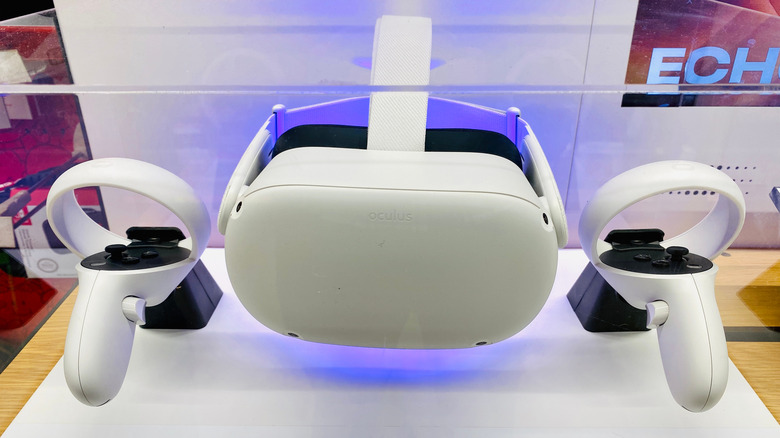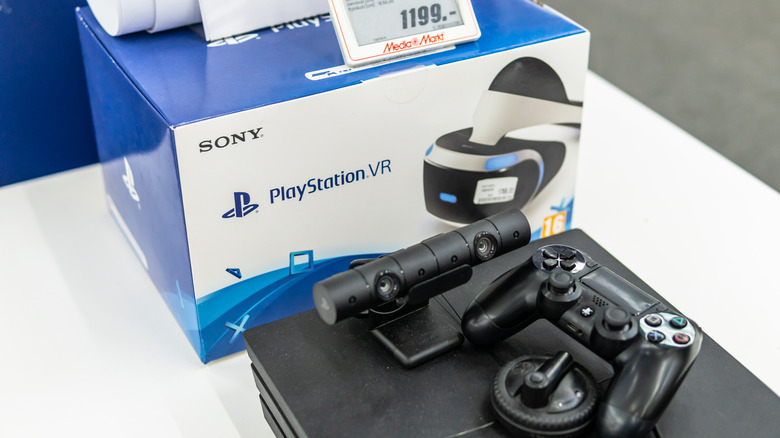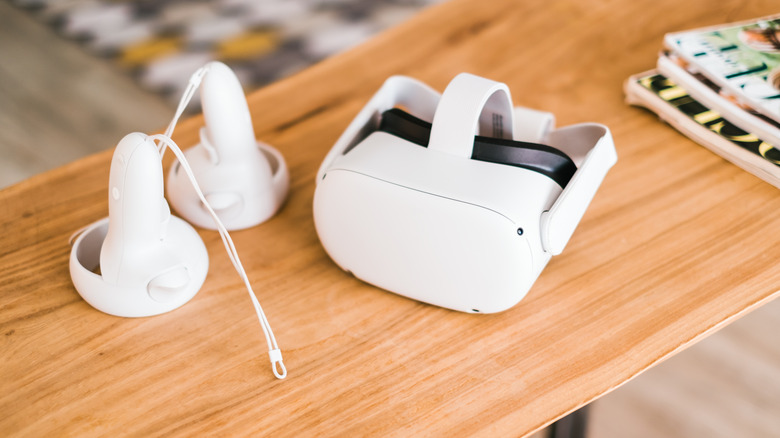The Majority Of People We Polled Wouldn't Buy A Meta Quest 2 VR Headset Now That It's $100 More Expensive
Since its launch in 2020, the Meta Quest 2 has been one of the cheapest virtual reality (VR) headsets on the market. For just $300, buyers could experience VR right out of the box. In addition to being more expensive than the Quest 2, other headsets also required accessories like tracking towers and a wired connection to a high-end gaming PC. Meta's device is completely wireless and powerful enough to run a vast library of games all on its own. However, nothing lasts forever. After almost two years, the cheap device received a fairly significant price hike, jumping up by over 33%. The 128GB version now costs $399, while the 256GB version will set you back $499.
This isn't an unfamiliar price point for Meta. The original Oculus Quest, which was released in May 2019, sold from that amount. This could be part of the reason why Meta felt comfortable jacking up the price of the Quest's successor. The original sold out when VR as a concept was less popular, so a more powerful version should do okay now that VR is more mainstream, and the Meta Quest 2 is established as the go-to platform.
There had been warning signs a price rise was on the horizon for some time, and Meta did announce that it planned to charge more for its flagship headset well in advance of the price hike, giving users time to grab one at the lower rate. Still, people aren't happy with the new price point. The vast majority of the 590 United States residents SlashGear surveyed said they would not pay $400 for an Oculus Quest 2. But how many are still planning on getting a Quest 2? And is it still good value even at $400? Let's take a look.
Quest is still the cheap option
Despite the price hike, if you want to get into VR, the Meta Quest 2 is still your cheapest option by far. Cheaper alternatives do exist, but they're all based around the Google Cardboard system. You'll essentially be buying a plastic headset you can put your phone into, and the experience will be pretty low quality. There's also the second-hand market and tech goes on sale a few times a year, such as during Amazon's annual Prime Day event and on Black Friday.
As far as alternative headsets of similar or better quality go, PlayStation VR's headset is now $50 cheaper, but requires you to have a PS4. A full Valve Index kit, which includes the controllers and towers you'll need to use it, is over $1,000, as is the HTC Vive Pro 2. The HP Reverb G2 is the cheaper option, but still has an MSRP of $599.99, and all three of those headsets require a fairly powerful gaming PC, which can add over $1,000 to the bill.
There's also an argument that alternative headsets offer a worse experience than the Quest 2. Yes, there are headsets with better resolution and a wider field of view. If you have the money and patience to set it up, you can also get full-body tracking quite easily on the Index or Vive. But all of them lack the inside-out tracking of the Quest 2, and none of them are natively wireless. Being tethered and restricted to a play area you've mapped out with external sensors is a pain. The Quest 2 offers you a way around that, and it still does so for a fraction of the price.
Meta's price bump has put a lot of people off
According to our survey, fewer than 20% of the 590 people we polled would buy a Meta Quest 2 following the price hike, with close to 77% saying they would not make the purchase. The remaining 3.22% already owned a Quest 2, which isn't surprising given the popularity of the device. The initial response to the price hike on social media was less one-sided. While those on the fence were discouraged by the increase, there were also plenty of people who could see things from Meta's point of view. Some conspiracies were also flying around, including claims that Meta was bumping the price to clear stock before a new headset was announced. While some may not make the purchase now that the price has increased, the few weeks of notice Meta gave before the price bump may have encouraged a few people to take the plunge while the headsets were still cheap, relatively speaking.
The theory may have some basis. Meta is certainly planning to release a new headset, but once you look into the details, the stock clearance motive just doesn't make sense. Meta's new device, which has been referred to as the Meta Quest Pro and Project Cambria, is expected to be a high-end platform designed to showcase the most advanced VR technology the company currently has on offer. Features are likely to include pancake lenses, which are smaller than the lenses used in the Quest. This will allow for a smaller and lighter headset, solving two of VR's major issues. Other features include a higher resolution display, significantly more processing power, and a new set of controllers that each have their own inside-out tracking cameras. The Quest Pro is not entry-level and isn't replacing the Quest 2.
Meta's VR department has lost a lot of money
The Quest 2 was dominating the market and the device's success has allowed Meta to establish itself as the main player in the VR world. This status has enabled it to corner major exclusives, and extend a lot of leverage when trying to bring competitors on board with its plans for a Metaverse Standards Forum. So why would the company risk any of that for an extra $100 per headset?
Meta's exact costs and margins for each Quest 2 aren't known, but it has long been assumed the company has been selling the headsets at a loss or, at best, break-even in an attempt to build a firm customer base and establish VR as a mainstream medium. Virtual reality is arguably in a better position than it has ever been, and Meta has taken the largest slice of the virtual pie. This may be why the company felt safe jacking the price up a bit. There's also the argument that Meta didn't have much of a choice in the matter. Despite 2021 being a positive year overall for Meta, its financials revealed that Reality Labs, the company's VR sector, had lost around $10 billion.
While Mark Zuckerberg has a lot of enthusiasm for VR projects and more than likely believes he can make the Metaverse project a reality, Meta's shareholders may be a touch more skeptical. Following the announcement, the company's stock tanked by more than 20%, and its VR department received a large portion of the blame. Given the losses and the backlash, it's obvious that something had to be done to appease shareholders. Meta's upper management probably faced the same decision its potential customers are facing now. Would you rather have a slightly more expensive Quest or no Quest at all?



